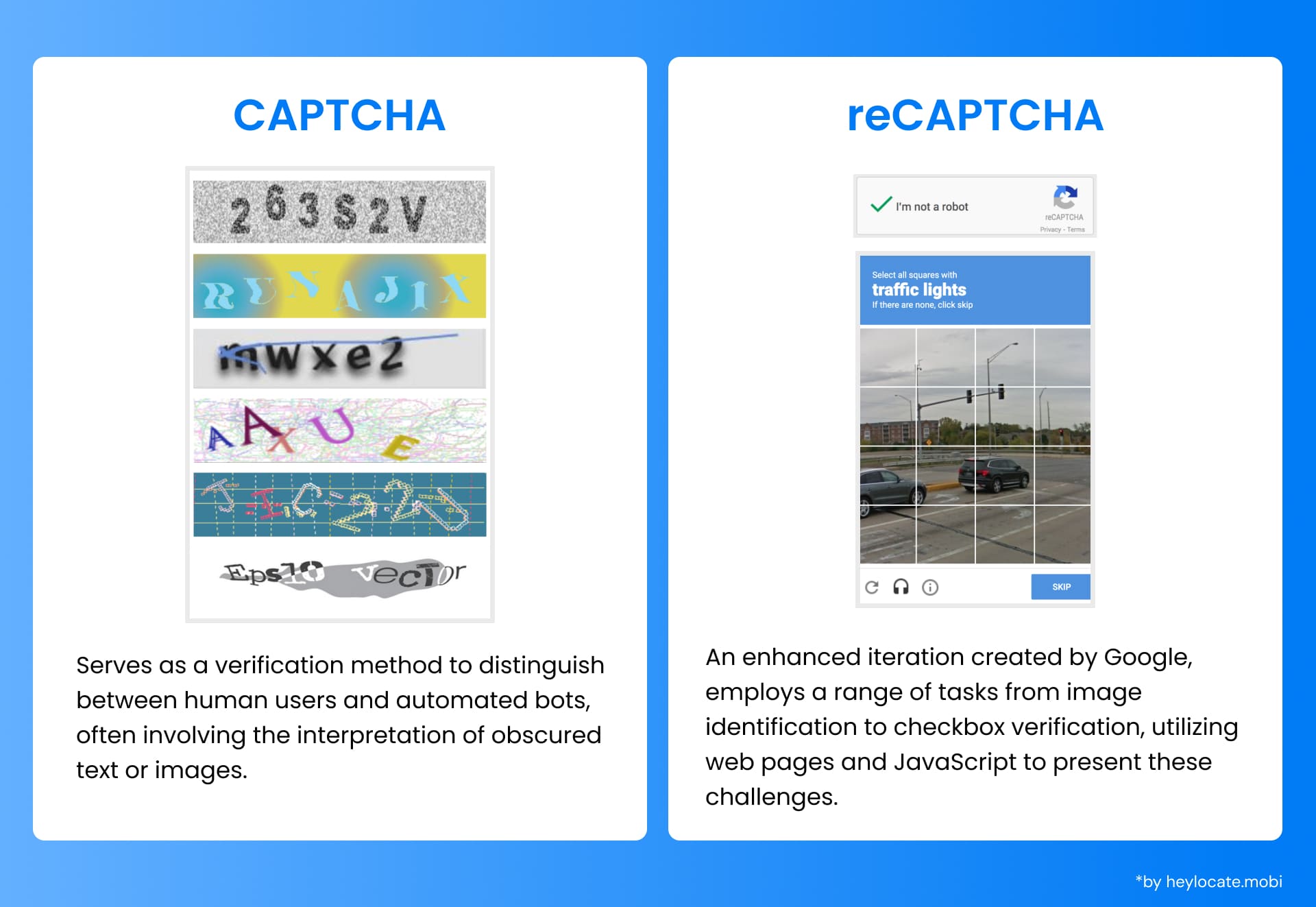CAPTCHA (Completely Automated Public Turing Test to tell Computers and Humans Apart)
What is CAPTCHA?
CAPTCHA, or Completely Automated Public Turing Test to Tell Computers and Humans Apart, is a challenge-response test aimed at distinguishing human users from automated bots. Its fundamental objective is safeguarding websites and online services against automated threats such as spamming, data scraping, and brute-force login attempts. By presenting straightforward tasks for humans yet arduous for machines, CAPTCHA ensures the legitimacy of user engagements and upholds the integrity of online platforms.

The Evolution of CAPTCHA
The concept of CAPTCHA emerged in 1997 through the efforts of researchers at Carnegie Mellon University. Coined by Luis von Ahn, Manuel Blum, and Nicholas J. Hopper in 2003, CAPTCHAs initially featured distorted text that demanded human-like pattern recognition skills, posing a formidable hurdle for computer programs.
Key Innovations and Services
The evolution of CAPTCHA has seen significant innovations. In 2007, Google introduced reCAPTCHA, amalgamating text recognition and image analysis to validate user interactions. This advancement bolstered security and facilitated book digitization through optical character recognition (OCR) tasks. In 2019, Google acquired hCAPTCHA, providing an alternative to reCAPTCHA and enabling website owners to diversify their CAPTCHA providers.
Preventing Spam and Abuse
Primarily, CAPTCHA is a bulwark against spam and abuse on websites and online platforms by impeding automated bots attempting to inundate these platforms with unwanted content or bogus user registrations. Website administrators can substantially diminish spam by mandating users to verify their human identity, enhancing user experience and upholding content quality and credibility.
Traditional text-based CAPTCHAs, while prevalent, are facing challenges in efficacy as spamming techniques evolve. To counter this, newer CAPTCHA iterations integrate behavior-based approaches like object identification in images or puzzle-solving to more accurately discern between humans and bots, furnishing an additional layer of protection.
Design and Functionality
Regarding design and functionality, text-based CAPTCHAs typically present users with distorted or obscured text to decipher, striking a balance between legibility for humans and complexity for automated solutions. Nonetheless, concerns regarding accessibility and inclusivity arise due to variations in complexity, language, and visual abilities. Alternatives such as audio-based CAPTCHAs or the option to request different CAPTCHAs are made available to mitigate these concerns. Additionally, some CAPTCHA services offer customization features to enhance user experience and accessibility.
AI and CAPTCHA
Interestingly, CAPTCHA intersects significantly with artificial intelligence (AI). The intricacy of CAPTCHA challenges serves as a yardstick for evaluating the capabilities of AI technologies. As AI algorithms advance, they exhibit greater proficiency in solving CAPTCHAs, necessitating the development of even more intricate designs. This symbiotic relationship between CAPTCHA and AI fosters innovation and propels advancements in both fields, resulting in continual enhancements in security and usability. Moreover, incorporating challenging AI problems such as image recognition or language understanding within CAPTCHAs poses a rigorous test for humans and harnesses their cognitive abilities to contribute to AI research and development. By crowdsourcing human intelligence through CAPTCHA tasks, valuable data is generated, aiding in the refinement and training of AI models.
References
- “Websites using hCaptcha”. trends.builtwith.com.
- “hCaptcha – About Us”. www.hcaptcha.com.
- “Inaccessibility of CAPTCHA”. www.w3.org.
- “Why are CAPTCHAs so hard to read?”. Quora.
- CAPTCHA – Wikipedia CAPTCHA – Wikipedia
- reCAPTCHA – Wikipedia reCAPTCHA – Wikipedia